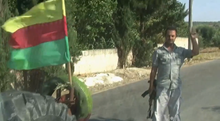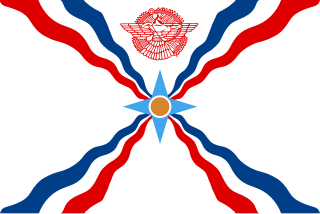
Assyrians in Syria are an ethnic and linguistic minority that are indigenous to Upper Mesopotamia, the north-eastern half of Syria. Syrian-Assyrians are people of Assyrian descent living in Syria, and those in the Assyrian diaspora who are of Syrian-Assyrian heritage.

Al-Hasakah is the capital city of the Al-Hasakah Governorate, in the northeastern corner of Syria. With a 2023 estimated population of 422,445 Al-Hasakah is predominantly populated by Arabs with large numbers of Kurds, Assyrians and a smaller number of Armenians. Al-Hasakah is 80 kilometres south of the city of Qamishli. The Khabur River, a tributary of the Euphrates River, flows west–east through the city. The Jaghjagh River flows into the Khabur from the north at Al-Hasakah. A portion of the city is a Syrian government-controlled enclave, comprising the city center and various government buildings, with the rest of the city controlled by the AANES.

Tell Abyad is a town in northern Syria. It is the administrative center of the Tell Abyad District within the Raqqa Governorate. Located along the Balikh River, it constitutes a divided city with the bordering city of Akçakale in Turkey.

The Democratic Union Party is a Kurdish left-wing political party established on 20 September 2003 in northern Syria. It is a founding member of the National Coordination Body for Democratic Change. It is the leading political party among Syrian Kurds. The PYD was established as a Syrian branch of the Kurdistan Workers Party (PKK) in 2003, and both organizations are still closely affiliated through the Kurdistan Communities Union (KCK).
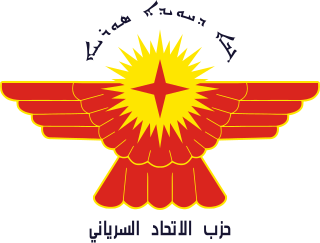
Syriac Union Party in Syria is a secular Assyrian/Syriac political party in Syria that represents the interests of Assyrians in Syria and is committed to the Dawronoye modernization ideology. Established on 1 October 2005, since the start of the Syrian Civil War it has positioned itself on the side of secular, democratic, socialist and federalist Kurdish forces in Rojava, skeptical of both the Ba'athist Syrian government of Bashar al-Assad and the National Coalition for Syrian Revolutionary and Opposition Forces.

The Autonomous Administration of North and East Syria (AANES), also known as Rojava, is a de facto autonomous region in northeastern Syria. It consists of self-governing sub-regions in the areas of Afrin, Jazira, Euphrates, Raqqa, Tabqa, Manbij, and Deir Ez-Zor. The region gained its de facto autonomy in 2012 in the context of the ongoing Rojava conflict and the wider Syrian civil war, in which its official military force, the Syrian Democratic Forces (SDF), has taken part.

The Syriac Security Office, commonly known as the Sutoro or the Sutoro Police, is a Christian Assyrian/Syriac police force in Jazira Region of the Autonomous Administration of North and East Syria in Syria, where it works in concert with the general Asayish police force of the canton with the mission to police ethnic Assyrian areas and neighbourhoods. Its establishment is associated with the Syriac Union Party (SUP).

The Internal Security Forces, also known as the Asayish in the Jazira, Euphrates, and Afrin Regions, is the police force of the autonomous regions of Rojava. Formed in the early stages of the Syrian Civil War, it had initially been established to police areas controlled by the Kurdish Supreme Committee. In October 2013, the Asayish claimed to have 4,000 members; by 2017, the number had reportedly risen to over 15,000.

Euphrates Region, formerly Kobanî Canton, is the central of three original regions of the Autonomous Administration of North and East Syria, comprising Ayn al-Arab District of the Aleppo Governorate, Tell Abyad District of the Raqqa Governorate, and the westernmost tip of the Ras al-Ayn Subdistrict of the Ras al-Ayn District of Al-Hasakah Governorate. Euphrates Region unilaterally declared autonomy in January 2014 and since de facto is under direct democratic government in line with the polyethnic Constitution of Rojava.

The Jazira Region, formerly Jazira Canton,, is the largest of the three original regions of the de facto Autonomous Administration of North and East Syria (AANES). As part of the ongoing Rojava conflict, its democratic autonomy was officially declared on 21 January 2014. The region is in the Al-Hasakah Governorate of Syria.

The Movement for a Democratic Society is a left-wing umbrella organization in northern Syria founded on 16 January 2011 with the goal of organizing Syrian society under a democratic confederalist system. TEV-DEM is currently chaired by co-chairs Zalal Jagar and Kharib Heso.

The Syrian Democratic Forces (SDF) is a coalition of ethnic militias and rebel groups in North and East Syria (AANES). An alliance of forces formed during the Syrian civil war composed primarily of Kurdish, Arab, and Assyrian/Syriac, as well as some smaller Armenian, Turkmen and Chechen forces. It is militarily led by the People's Protection Units (YPG), a Kurdish militia recognized as a terrorist group by Turkey. SDF also includes several ethnic militias, and various factions of the Syrian opposition's Free Syrian Army. Founded in October 2015, the SDF states its mission as fighting to create a secular, democratic and federalised Syria. According to Turkey, the Syrian Democratic Forces has direct links to the PKK.

The Rojava conflict, also known as the Rojava Revolution, is a political upheaval and military conflict taking place in northern Syria, known among Kurds as Western Kurdistan or Rojava.

The Autonomous Administration of North and East Syria is a de facto autonomous region of Syria that emerged from 2012 onwards during the Syrian civil war and in particular the Rojava conflict. The current administration emphasises gender equality and pluralistic tolerance for religious and cultural diversity.

The Syrian Democratic Council is the political wing of the Syrian Democratic Forces in the Autonomous Administration of North and East Syria (AANES). The SDC's stated mission is working towards the implementation of a "Pluralistic, democratic and decentralized system for all of Syria".

A number of Christian militias in Iraq and Syria have been formed since the start of the Syrian Civil War and in the 2013-2017 War. The militias are composed of fighters mainly from the Aramean but also include Arab and Armenian Christian communities in Syria, and Arameans in Iraq have formed militias in the north to protect Syriac communities, towns and villages in the Aramean homeland and Nineveh Plains. Some foreign Christian fighters from the Western world have also joined these militias.
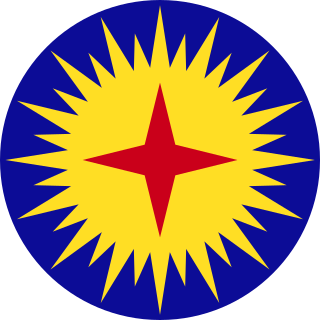
Dawronoye is a secular, leftist, national liberation movement among the Assyrian people. Ideologically characterized by progressive ideas and including socialist elements, its founding roots can be traced to the late 1980s in the town of Midyat in Turkey. The modern manifestation of the movement is controversial among Assyrian organizations worldwide, particularly due to its ties to the Kurdistan Workers' Party (PKK) and the Democratic Union Party (PYD).
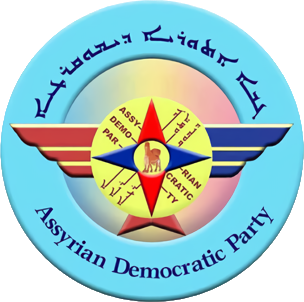
The Assyrian Democratic Party is an Assyrian political party active in Syria, that traditionally represents the interests of the Eastern Assyrians of the Khabur valley. Although aiming for the peaceful implementation of democracy in Syria, the party has generally sided and cooperated with the Ba'athist government since the 1990s. In course of the Syrian Civil War, the Assyrian Democratic Party has come to be closely affiliated with the Khabour Guards and Nattoreh. It is part of the Syrian Democratic Council of Rojava.

The first local elections in the Democratic Federation of Northern Syria were held on 22 September 2017. Representatives of 3,700 communes in the regions of the Northern Syria Federation were selected in the election, involving 12,421 candidates. The communal elections on 22 September were followed by elections of local councils in December and a federal parliamentary election of the People's Democratic Council, the region's highest governing body, in 2018. Some areas controlled by the Syrian Democratic Forces were not included in the election, including the city of Manbij.

The first Rojava regional elections were held on 1 December 2017. Local councils for the Jazira Region, Euphrates Region and Afrin Region were elected as well as for the subordinate cantons, areas and districts of the regions of Rojava. This followed the communal elections that were held on 22 September and will be followed by a federal parliamentary election of the Syrian Democratic Council, the region's highest governing body, initially scheduled for January 2018, but was later postponed.

